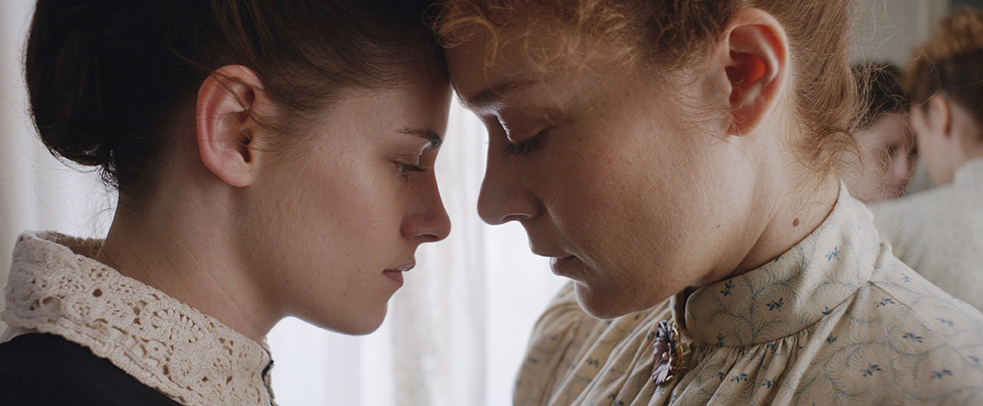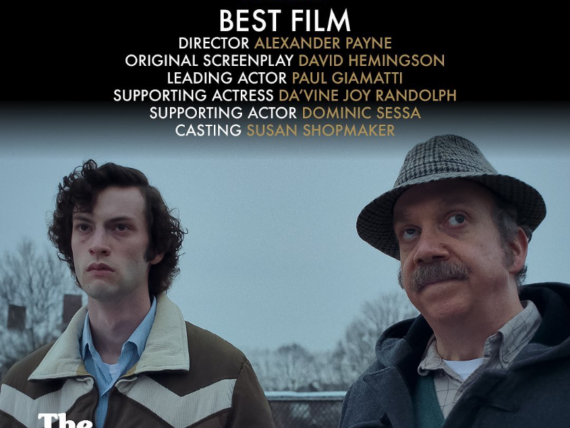Reviewed here by Helen Tope, Lizzie is showing in our cinema until Thursday 21 February.
If you’re watching Lizzie, chances are you already know the story. On 4 August 1892, Thomas and Abby Borden were found murdered in their home in Fall River, Massachusetts. Bludgeoned with an axe from their wood-shed, the only other person in the house was their daughter, Lizzie.
Arrested and put on trial, the case of Lizzie Borden became notorious in American legal history. Despite evidence presented at the trial, Borden was acquitted and released. Lizzie, starring Chloe Sevigny and Kristen Stewart, looks at the events leading up to the crime.
Lizzie pieces together both the known facts and the theories that have surrounded Borden. It is suggested she was epileptic; prone to fits and blackouts; a possible victim of sexual abuse at the hand of her father. She was also a wealthy woman, at risk of losing her sizeable inheritance to both her stepmother, Abby, and her uncle, John V. Morse. The film attempts to unpick these theories; looking at each in turn. What emerges is a portrait of a woman that is complicated and deeply unsettling.
Borden, under Sevigny’s revision, is calm, studious and patient. Given the evidence; forensics and a modern jury would send Lizzie straight to the electric chair. But in 1892, her social standing sets her free. A well-bred woman cannot be guilty of murder. The thing that Lizzie is rebelling against, is what saves her.
The film, a slight 106 minutes, packs a lot in. The chill atmosphere of the Borden household; creaking floorboards and hidden secrets, is brilliantly conveyed by director Craig William Macneill. The narrowness of their lives, compounded by a breathtaking hypocrisy from Andrew Borden, is ready to explode at any moment.
A rich family, Andrew Borden guards the purse strings with zealotry – they live well under their means. The house is dimly-lit throughout; it is a large house but only serviced by one maid. As an heiress to a fortune, Borden should be living the high life. Instead she is confined to the house for long periods of time. It is an existence that is mean, dark and airless.
It is a life Lizzie no longer wants to be part of. She is not prepared to wait for her father to die, or risk her multi-million dollar inheritance falling into her stepmother’s hands when he does. Borden sees herself as having few options – and takes the most drastic course.
With Lizzie, the big reveal is not the double-murder. Looking at the Borden’s back story, we are asked to consider the motives for this crime. A bid for freedom, financial independence, or something altogether more sinister. Chloe Sevigny’s Lizzie is sensitive and refined, with a love of opera and poetry. But she is also mercenary and vengeful. We are never quite sure whether we are watching the heroine or the villain.
It is hard not to engage with Borden from a 21st-century perspective; her fate in our legal system would be very different. What the film suggests is that punishment can take many forms. The future Lizzie imagines for herself is very different to what transpires. It also suggests a naivety on her part. It is clear in the scenes that follow after the murders, that Borden’s mind is one of process, not consequences.
There are few murder stories that would stand up to a retrospective telling, but Lizzie Borden’s tale is such a potent mixture of fact and fiction, there is room to surmise where the facts dry out. We join the story where a new maid joins the Borden household. Bridget Sullivan (Kristen Stewart) works as the Borden’s housekeeper and quickly befriends Lizzie. How far the relationship between Sullivan and Borden went, is something unknowable to contemporary sources. The film makes decisions on the spots of Lizzie’s life that are least illuminated. Here, their relationship blossoms into a love and loyalty that nearly costs Sullivan everything.
Far from being tokenist, this LGBT reading of their relationship makes sense. Lizzie’s fear that she will always be suppressed by men (her inheritance today would be worth a cool $8.3 million), makes her more vulnerable, not less. Sullivan would be easy for Borden to trust.
The range of options available to Borden cast the film’s morality in a strange light. In these times, under these circumstances, how far would you go for independence? Pulling the strings, Chloe Sevigny’s performance as Borden is deftly complex. She doesn’t make it easy for us to sympathise with Lizzie, as the character moves from victim to schemer in the blink of an eye. We are reminded, often seeing Borden’s life through Sullivan’s gaze, that Lizzie is still a woman of privilege. As Bridget, a maid subjected to physical and sexual abuse from Lizzie’s father, Kristen Stewart gives us the flip side of 19th century life. At 25, she has already been working in service for over a decade and cannot expect anything better. Sullivan – without connections, without inheritance – has far more to lose.
The feeling of confinement – a slow suffocation – is central to this film. Borden is often filmed, framed in doorways and windows – enclosed and surrounded. The textures used in the set design, cram the screen. The delicate, bleached lace in Lizzie’s bedroom; the fraying hay bales in the pigeon loft. Sound is used to get us out of the contained silence of the Borden household. A scream breaks the seal.
Lizzie immerses you into Borden’s world, and it takes a while to clamber back into the 21st century. As a piece of evocative film-making, Lizzie thoroughly succeeds. Its depiction of women’s lives in 19th century Massachusetts is honest and unflinching. Its depiction of the murders is more ambiguous. The motives, crime and punishment are surrounded by theory and conjecture. With scant evidence, Borden’s case still invites debate. The exact timeline of that day remains open to interpretation. As the film presents its best guess – and it’s a good one – we are left to question whether Borden finally got what she deserved.
Helen Tope









Comments
Comments are closed.